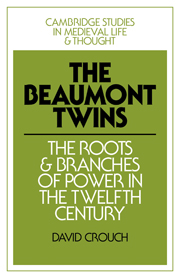Book contents
- Frontmatter
- Contents
- List of illustrations
- Preface
- List of abbreviations
- PART I NARRATIVE
- PART II ANALYSIS
- 4 THE HONORIAL BARONAGE
- 5 ADMINISTRATION
- 6 REVENUES
- 7 THE BEAUMONTS, THE CHURCH AND THE WIDER WORLD
- 8 CONCLUSION
- Appendix I A new source for the death of Robert of Meulan, A. D. 1118
- Appendix II Genealogical tables: I. Tourville, II. Harcourt, III. Hereditary stewards of Meulan
- Bibliography
- Index
7 - THE BEAUMONTS, THE CHURCH AND THE WIDER WORLD
Published online by Cambridge University Press: 05 March 2012
- Frontmatter
- Contents
- List of illustrations
- Preface
- List of abbreviations
- PART I NARRATIVE
- PART II ANALYSIS
- 4 THE HONORIAL BARONAGE
- 5 ADMINISTRATION
- 6 REVENUES
- 7 THE BEAUMONTS, THE CHURCH AND THE WIDER WORLD
- 8 CONCLUSION
- Appendix I A new source for the death of Robert of Meulan, A. D. 1118
- Appendix II Genealogical tables: I. Tourville, II. Harcourt, III. Hereditary stewards of Meulan
- Bibliography
- Index
Summary
CHURCH PATRONAGE
Although Count Robert I has been credited with the foundation of two Benedictine priories – at Meulan and Toft Monks, Norfolk – there is reason to believe that this is an error. The regularisation of the college of St Nicaise of Meulan seems to have been the work of Count Hugh, and monks of Préaux are not found at Toft until the thirteenth century. No regular house can therefore claim the count as a founder, despite an active political career of over forty years. The count's relations with the Church were not always of the best. His rivalry with Archbishop Anselm is the best-known episode of his life. There even appear to be a number of anticlerical actions traceable to him outside his conflict with Gregorianism. At his death he left unsettled two quarrels with abbeys under his patronage; he had taken lands from La Croix St-Leuffroy and revenues from St Peter of Préaux and not returned them. Nonetheless, Count Robert did not spurn the regulars. His extant charters show that he patronised Benedictines and Cluniacs. He made or confirmed grants to Abingdon, Bee, Bermondsey, Jumièges and Lenton. He continued in grand style his family's patronage of their abbeys at Préaux, granting churches, tithes, sizeable rents, and manors in England and Normandy. But he clearly saw no purpose to be served by multiplying regular foundations.
What Count Robert did was to follow enthusiastically his father's example in founding colleges of secular canons.
- Type
- Chapter
- Information
- The Beaumont TwinsThe Roots and Branches of Power in the Twelfth Century, pp. 196 - 212Publisher: Cambridge University PressPrint publication year: 1986



